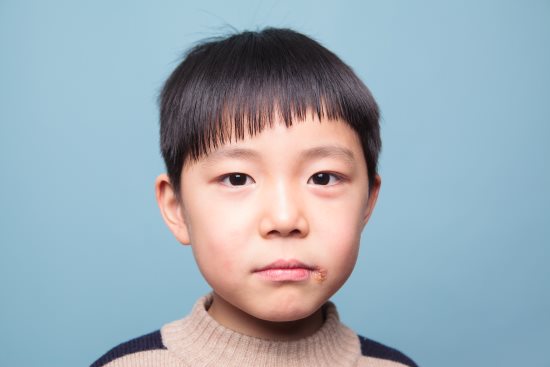About cold sores
Cold sores are tiny blisters caused by herpes simplex virus.
Once you have herpes simplex virus, it sleeps in the nerves beneath your skin for life. The virus can wake up and cause cold sores when your immune system is under stress – for example, during a viral illness, hormonal changes or sunburn. It can also flare up when older children have periods.
Herpes simplex virus is very contagious. You can get it through skin-to-skin contact, contact with an infected person’s saliva, or contact with contaminated objects. It can spread even if people don’t have blisters.
Children and teenagers who have weak immune systems because of illness or medicines are more likely to have frequent, long-lasting or severe cold sores. And they’re more likely to develop complications from cold sores. Young babies are also more likely to develop complications.
Cold sores are quite common in older children and teenagers.
Symptoms of cold sores
Your child might complain of an itching, tingling or burning sensation around the mouth, lips or nose before tiny blisters appear. The blisters usually crust over in 2-3 days, but they can become quite painful and interfere with eating and drinking.
Cold sores generally clear up completely after 7-10 days. They don’t leave any scarring.
Some children and teenagers get cold sores several times a year, usually in the same place.
When children and teenagers get herpes simplex virus for the first time, the cold sores are often mild. In some children and teenagers, the first infection doesn’t even cause symptoms. In others, the first infection might cause a lot of cold sores in the mouth, with fever and pain. This is known as herpes simplex mouth infection.

Complications of cold sores
A very rare complication of herpes simplex virus is an infection of the brain known as encephalitis.
Medical help: when to get it for children and teenagers with cold sores
You should take your child to the GP if your child has:
- cold sores that are weeping or starting to spread
- a fever as well as cold sores
- painful cold sores several times a year
- trouble attending school because of cold sores.
You child also needs to see the GP if their cold sores make drinking hard, even after pain relief. This might lead to dehydration, especially if your child is young.
You need to take particular care if you have a baby aged under one month. You should take your baby to the GP if they:
- have a fever
- seem unwell
- develop cold sores on their skin or eye area within 3 weeks of being kissed by or touching the face of someone with cold sores.
See your GP or go to your nearest hospital emergency department if your child a seizure or is confused, drowsy or behaving unusually. These could be signs of encephalitis.
You know your child best. If your child seems unwell, seek medical attention.
Treatment for cold sores
Cold sores usually don’t need special treatment.
If your child is uncomfortable, paracetamol or ibuprofen in recommended doses can help ease the pain.
Your GP or pharmacist might recommend povidine-iodine ointments like Betadine or anti-viral ointment like aciclovir. These ointments can help cold sores go away faster if you apply them very early, at the first sign of infection when the area is tingling.
If your child has very severe or very frequent cold sore outbreaks, they might be prescribed an anti-viral medicine to reduce how often outbreaks happen and how long they last.
If your baby is unwell, they might need to go to hospital to be assessed and get anti-viral medicines.
If your child has cold sores, make sure your child has enough fluids, even if drinking is painful. Our article on preventing and treating dehydration explains how much fluid children of different ages need and how often they need it. Ice blocks might be especially helpful for numbing the pain and making drinking more comfortable.
Don’t give aspirin to children under 12 years unless it’s prescribed by a doctor. Aspirin can increase the risk of Reye’s syndrome, a rare but potentially deadly condition. If you’re giving your child any over-the-counter medicines, check with your pharmacist or doctor to make sure these have no aspirin.
Prevention of cold sores
To prevent cold sores, your child should avoid:
- direct contact with someone who has cold sores or a herpes simplex mouth infection
- utensils, glasses or towels that have been used by someone with cold sores or a herpes simplex mouth infection
- things that trigger cold sore outbreaks – for example, lack of sleep and sunburn.
If you have a baby, it’s best for people with cold sores or a herpes simplex mouth infection to avoid direct contact with your baby. If this isn’t possible, they should wash hands carefully before holding your baby and also avoid kissing your baby.